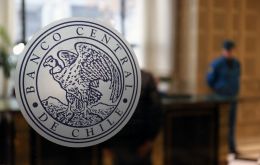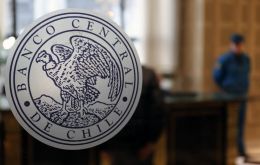MercoPress. South Atlantic News Agency
Tag: Central Bank of Chile
-
Tuesday, July 12th 2022 - 13:08 UTC
Inflation in Chile at record level since June 1994

Inflation in Chile reached 0,9% in June, 7,1% in the first half of the year and 12,5% in the last twelve months, which is the highest since 28 years, in June 1994.
-
Friday, May 6th 2022 - 09:45 UTC
Chile's base rate increased 125 points to 8,25%, highest since September 2008

Private estimates fell short in Chile on Thursday when the Central Bank monetary policy desk announced an increase in the base rate of 125 points, to 8,25%, the highest since September 2008 in an effort to contain the strong sustained inflation. According to the bank's chair, Rosanna Costa the monetary policy desk decision was unanimous.
-
Saturday, April 9th 2022 - 08:20 UTC
Chile's inflation for March above market projections

For a month that began under one president and finished under the new one, Chile's inflation for March of 2022 reached 1.9%, slightly above market projections of up to 1.4%.
-
Tuesday, February 8th 2022 - 09:37 UTC
2021 was a good year for foreign direct investment in Chile, the highest since 2015

Foreign Direct Investment, FDI, in Chile during the twelve months of 2021 reached US$ 16,782 billion, the best amount since 2015, according to the Central bank which added it represented a 95% increase over 2020. Overall it was 62% higher than the average of the last five years, and 16% above the 2003/2021 average.
-
Friday, January 28th 2022 - 11:50 UTC
Chile raises reference rate to 5,5% to combat inflation: More could come

The Chilean central bank hiked its reference rate from 4% to 5,5% to contain inflation which last year reached 7,2%, the highest in fourteen years. The Monetary Policy council of the bank on Wednesday agreed unanimously to increase the reference rate by 150 base points, according to the official release.
-
Thursday, October 14th 2021 - 09:21 UTC
Chilean central bank surprises markets, increases basic rate from 1,5% to 2,75%

Given the latest spike of inflation in Chile which jumped 1,2% in September, the central bank council surprised markets by increasing the basic monetary lending rate 125 points, that is from 1,5% to 2,75%, the highest since 2001. The five-member Council decision was unanimous.
-
Saturday, September 11th 2021 - 04:55 UTC
Inflation in Chile reached 3,2% in eight months and the US dollar 794 Pesos

The Consumer Prices Index, CPI, in Chile climbed 0,4% during August totaling 3,2% so far this year and 4,8% in the last twelve months, according to the country's stats office. It is the highest since January 2016, and the tendency is to continue increasing, as had been anticipated by the Central Bank. Likewise with the US dollar.
-
Wednesday, September 1st 2021 - 09:20 UTC
Chilean central bank surprises markets: basic interest rate doubled to 1,5%

The Monetary Council of the Chilean central bank surprised markets on Monday by deciding to increase the basic interest rate 75 base points to 1,5%, the highest jump since August 2001. According to a bank release, the decision from the council was unanimous, and well beyond market expectations that had estimated an increase of 25 to 50 base points.
-
Tuesday, April 13th 2021 - 09:48 UTC
Chile's Central Bank monthly report foresees 2021 inflation at 3.2%

Chile's monthly report issued by the Central Bank Monday forecast inflation to close 2021 with a cumulative 3.2%, with no significant changes in sight for 2022 and 2023.
-
Thursday, January 14th 2021 - 09:36 UTC
Anticipating a year of social instability, Chile plans to boost foreign reserves

Chile’s peso tumbled on Wednesday, starting the year in a volatile fashion as many had forecast. The currency dropped 2.1% to 741.66 against the dollar, bringing its decline this year to 4%.
